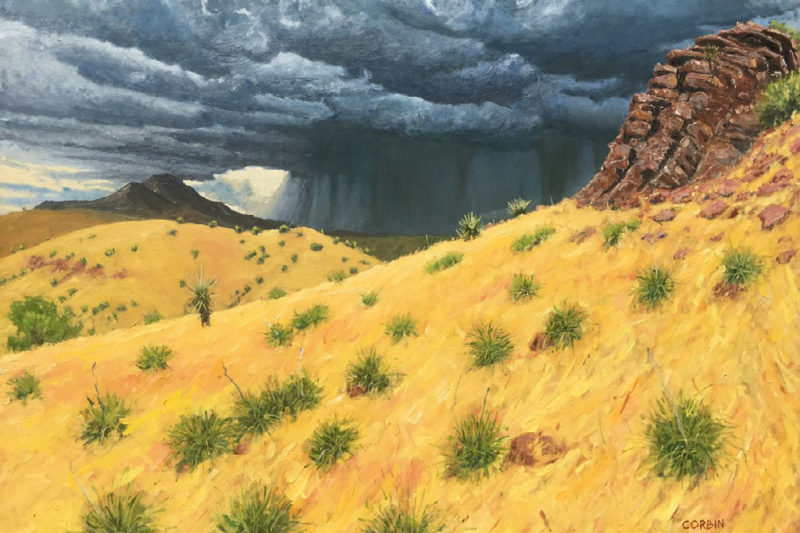Austin Veteran Arts Festival aims to reduce suicide through the arts
By Lauren Girgis
Reporting Texas
Vietnam combat veteran Glenn Towery won a gold medal in 2014’s National Veterans Creative Arts Festival, an annual competition using creative arts as rehabilitative treatment to help veterans recover from and cope with disabilities.
“When I came back, I felt so good,” Towery said. “And I thought, ‘Wow, I wish everybody could experience what I just experienced.’”
On the national level, the artists had to be finalists to participate in the competition. This inspired Towery to create a new festival — one that didn’t focus on competition, but health benefits for veterans. This is the idea behind the Austin Veteran Arts Festival: aiming to help heal Austin-area veterans through art therapy. Now being held for a third year, the festival invited more than 100 veterans to participate with their paintings, documentaries and dance performances.
Drew Corbin, a 47-year-old Georgetown resident, used hiking as an outlet after returning home from Iraq in 2007. Corbin spent his life going to museums and had family members who were art collectors.
“I really enjoyed looking at art and I knew that I couldn’t afford the art that I was looking at,” Corbin said. “So I was like, ‘You know what, I’m gonna make my own,’ and I really just made a decision to pick up painting and I coupled it with hikes. I really enjoy the Texas landscape. It really inspires me.”

West Texas Downpour, a painting by Drew Corbin, a military veteran who uses art as a healing practice
It’s Corbin’s first year participating in the festival, and two of his artworks were included in the virtual exhibit “To Be Seen.” The two paintings include a portrait of his daughter, titled “Layla,” and a landscape painting of a storm, titled “West Texas Downpour.”
“(Art) helped me stop thinking about some things that I was thinking about, because you kinda lose yourself,” Corbin said. “When I paint, I throw some music on, I’m totally involved in what I’m doing, and sometimes I’ll paint for hours and hours and hours and not think about anything else.”
About 30,177 active duty personnel and veterans of the post 9/11 wars have died by suicide, four times more than the 7,057 service members killed in post-9/11 war operations, estimates a Brown University study.
Peter Buotte, an art therapist and veteran, works with active duty service members and said the
art-making process, recreationally and in clinical therapy, can be part of a healing process.
“Returning from Iraq in 2004, I was making art to process my combat tour and at the same time, living and taking care of my mother, who was suffering from stage 4 ovarian cancer,” Buotte said in an email. “During that period, art was clearly therapy for me.”
Buotte said creating art usually involves a specific goal tied to emotions, such as drawing oneself in a safe space to process grief, loss or guilt. The second aspect of art therapy is the verbal processing of the artwork: what it is, how it was made, what it means. Talking about this in a group therapy session or individually with a therapist opens a deeper emotional resonance, Buotte said.
“Art (therapy) prompts offered by a certified art therapist are specific to achieving a certain … goal,” Buotte said. “In a clinical setting, the art process is the symbolic metaphor for identifying and working through specific issues, such as trauma, anxiety, depression and nightmares.”
Towery, who created the festival in 2017, said the festival is sponsored by the Veteran Suicide Prevention Channel, a 24/7 channel with video therapies and mindfulness tips.
The month-long festival is being held online this year, and was put on hold last year due to COVID-19. Towery and other festival organizers decided to resume the festival online out of concern that not holding it for two years would be “the death of the festival.”
For Towery, art was a key part of coping with his trauma.
“I was on medications for many years for PTSD and when I started painting and I started placing emphasis on art one day, I just told them that I wanted to stop taking the medications,” Towery said. “They (weaned me off) and I have not taken any medication for PTSD in seven or eight years. That doesn’t mean that I don’t have problems sometimes. I mean, I still have the same issues and problems. I just try to settle them by using the arts.”